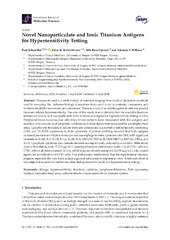| dc.contributor.author | Høl, Paul Johan | en_US |
| dc.contributor.author | Kristoffersen, Einar Klæboe | en_US |
| dc.contributor.author | Gjerdet, Nils Roar | en_US |
| dc.contributor.author | Pellowe, Amanda | en_US |
| dc.date.accessioned | 2018-08-03T11:33:46Z | |
| dc.date.available | 2018-08-03T11:33:46Z | |
| dc.date.issued | 2018-04-06 | |
| dc.Published | Høl PJ, Kristoffersen EK, Gjerdet NR, Pellowe A. Novel Nanoparticulate and Ionic Titanium Antigens for Hypersensitivity Testing. International Journal of Molecular Sciences. 2018;19(4):1101 | eng |
| dc.identifier.issn | 1422-0067 | |
| dc.identifier.uri | https://hdl.handle.net/1956/17981 | |
| dc.description.abstract | Titanium is used in a wide variety of materials ranging from medical devices to materials used in everyday life. Adverse biological reactions that could occur in patients, consumers, and workers should be monitored and prevented. There is a lack of available agents to test and predict titanium-related hypersensitivity. The aim of this study was to develop two bioavailable titanium substances in ionic and nanoparticulate form to serve as antigens for hypersensitivity testing in vitro. Peripheral blood mononuclear cells from 20 test subjects were stimulated with the antigens and secretion of monocytic and lymphatic cytokines and chemokines were measured by a multiplex bead assay. Lymphocyte stimulation indices were also determined in a subset of test subjects by measuring CD69 and HLA-DR expression by flow cytometry. Cytokine profiling revealed that both antigens increased production of typical monocyte and macrophage secreted cytokines after 24 h, with significant increases in IL-1β, IL-7, IL-10, IL-12, IL-2R, IL-6, GM-CSF, TNF-α, IL-1RA, MIP-1α, MIP-1β, IFN-α, and IL-15. Lymphatic cytokines and chemokines were not significantly induced by activation. After seven days of stimulation, ionic-Ti (2.5 μg/mL) caused proliferation (stimulation index > 2) of CD4+ cells and CD8+ cells in all persons tested (N = 6), while titanium dioxide nanoparticles (50 μg/mL) only caused significant proliferation of CD4+ cells. Our preliminary results show that the experimental titanium antigens, especially the ionic form, induce a general inflammatory response in vitro. A relevant cohort of test subjects is required to further elucidate their potential for predictive hypersensitivity testing. | en_US |
| dc.language.iso | eng | eng |
| dc.publisher | MDPI | eng |
| dc.rights | Attribution CC BY | eng |
| dc.rights.uri | http://creativecommons.org/licenses/by/4.0 | eng |
| dc.subject | allergy | eng |
| dc.subject | hypersensitivity | eng |
| dc.subject | titanium | eng |
| dc.subject | cytokine | eng |
| dc.subject | lymphoproliferation | eng |
| dc.subject | flow cytometry | eng |
| dc.subject | implant | eng |
| dc.subject | multiplex bead assay | eng |
| dc.subject | adverse effects of nanomaterials on immune system | eng |
| dc.title | Novel Nanoparticulate and Ionic Titanium Antigens for Hypersensitivity Testing | en_US |
| dc.type | Peer reviewed | |
| dc.type | Journal article | |
| dc.date.updated | 2018-04-16T11:41:41Z | |
| dc.description.version | publishedVersion | en_US |
| dc.rights.holder | Copyright 2018 The Author(s) | |
| dc.identifier.doi | https://doi.org/10.3390/ijms19041101 | |
| dc.identifier.cristin | 1579573 | |
| dc.source.journal | International Journal of Molecular Sciences | |

